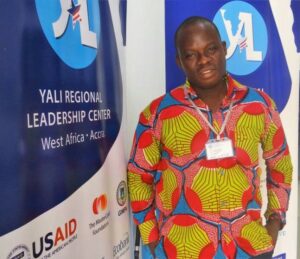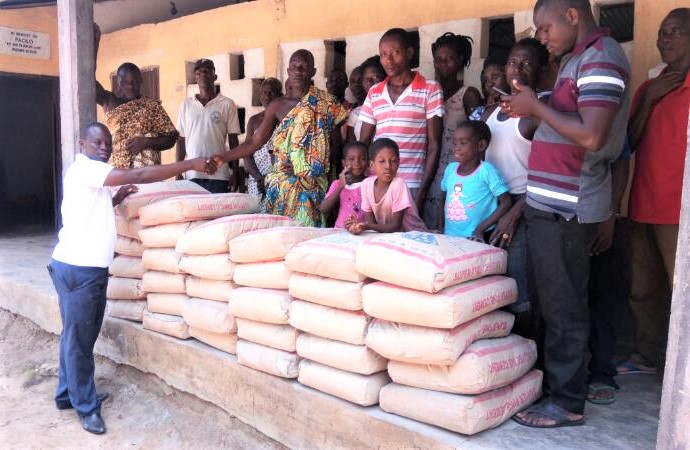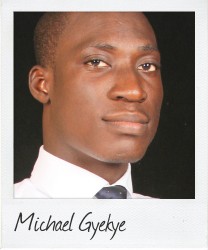“From teenage farmer to community leader”
December 7RCS Associate Fellow Julius Karl Fieve, 28, is one of the youngest people elected as an Assembly Member to represent his community at the District Assembly in Ghana. Michael Gyekye, 24, a Commonwealth Correspondent from Ghana, speaks with this rising young community leader.
Michael Gyekye: Can you tell us something about yourself – family, education and occupation?
Julius Fieve: I was born into a large family by two peasant farmers. I spent the first 10 years of my life with my late grandmother. I worked on the farm while growing up. I hold a BSc. Actuarial Science degree from the Kwame Nkrumah University of Science and Technology (KNUST) and an Executive Certificate in Project Management from the African Centre for Capacity Building (AFCAB). I currently work as the Programme Officer of the Global Women Development Promoters (GLOWDEP). I serve as an elected Assembly Member, representing the more than 6000 residents of the Mafi- Zongo Electoral Area in the Central Tongu District of the Volta Region of Ghana.
MG: What inspired you to contest elections to represent your community at your local assembly? Can you share some memories of your campaign?
JF: I am passionate about promoting development in my community and always desired to make a positive difference in the lives of the people, hence my motivation to contest. I beat three other contestants to the seat in a hotly contested race marked by the bandying of some vitriolic propaganda. After my victory, I went on to unite the polarized community and rally all for community development.
MG: How is your community doing in terms of social and economic development under your leadership?
JF: My community has witnessed a lot of social and economic development under my leadership. As an Assembly Member, I have led colleague Assembly Members from six other electoral areas to secure US $25000 in support from a local company, Prixim Consult, to repair a broken water system in the areas. I have also partnered with the Bright Generation Community Foundation to distribute 1000 pairs of shoes to students in the four basic schools in my community. Some of the beneficiary students had previously walked to school barefooted. I have also partnered the Rotary Club of Ho to put up a US $14000 two-unit Nursery Facility and Rest Rooms for the pupils of the Mafi – Zongo E.P Nursery. I also got a renowned local radio broadcaster Ms. Doreen Andoh, to donate books to all four basic schools in the area as part of her Book Farm Project.
MG: What is the greatest challenge you face as the Assemblyman (community representative) of your area? How do you intend to overcome it?
 JF: The bureaucracy and inertia in the governance system which results in frequent delays or non-attendance to the basic problems facing the people of the community is one major challenge. I however maintain a positive outlook by focusing on working to find novel solutions to the problems of the communities rather than concentrating on the setbacks. I also work more with local civil society organizations rather than the government to address our problems.
JF: The bureaucracy and inertia in the governance system which results in frequent delays or non-attendance to the basic problems facing the people of the community is one major challenge. I however maintain a positive outlook by focusing on working to find novel solutions to the problems of the communities rather than concentrating on the setbacks. I also work more with local civil society organizations rather than the government to address our problems.
MG: Where do you see yourself in leadership – in politics or otherwise, in the next five to ten years? Who is your political role model home or abroad?
JF: I see myself becoming a global leader blazing a trail in improving the lives of people around the world. I hope to be in a position where I can help the voiceless to be heard, the hopeless give hope and the defenseless provided bulwarks. President Barack Obama, Nelson Mandela and Dr. Kwame Nkrumah are my role models.
MG: Given your experience, how do you reflect on youth leadership and participation in politics in Ghana?
JF: I believe youth participation in leadership and politics in Ghana is high. What is left to be done is to ensure that these young leaders are properly trained to become ethical and servant leaders. The youth commonly perceive holding public office as profit-making avenues and hence become unable to concentrate on helping to develop and improve the lives of people in their communities.
MG: What issues of local governance do you wish an intergovernmental organization like the Commonwealth focused on to improve local governance in Commonwealth countries?
JF: I believe the youth should be trained to become ethical and servant leaders, and encouraged to go into local governance in countries in the Commonwealth. Also, aid for developmental projects should be directed to the local levels instead of the national governments where corruption is very high and rampant.
Related videos:
- https://drive.google.com/file/d/0B4e-C5y6wMZNdUVfUGhJUHkxWTg/view?usp=drivesdk
- https://www.youtube.com/watch?v=qlFJMCj2TwI
- https://youtu.be/bvEvdUfyO18
- https://www.youtube.com/watch?v=q5Z5w4PQ34o&t=192s
- https://www.youtube.com/watch?v=Nek4mZt6lqY
- https://youtu.be/7x3ToDnhzSI
Reach me on Facebook at Michael Adu Gyekye
Photo credits: courtesy of Michael Gyekye
…………………………………………………………………………………………………………………
About me: I aspire to be a communications, management and policy development consultant. I am a graduate of B. A Political Studies from the Kwame Nkrumah University of Science and Technology, Ghana. I am especially interested in politics, business, technology and sports. I love to read, write, facilitate programs, offer analytical commentary and travel.
…………………………………………………………………………………………………………………
Opinions expressed in this article are those of the author and do not necessarily represent the views of the Commonwealth Youth Programme. Articles are published in a spirit of dialogue, respect and understanding. If you disagree, why not submit a response?
To learn more about becoming a Commonwealth Correspondent please visit: http://www.yourcommonwealth.org/submit-articles/
…………………………………………………………………………………………………………





